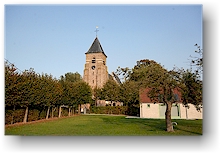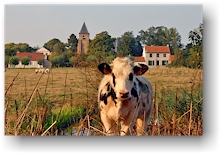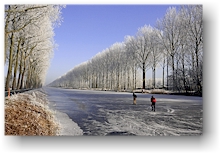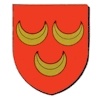




»
Hoeke church
» Hoeke windmill

» Canal "Damse
Vaart"

» Kobus' Ferry
» Krinkeldijk
|
Hoeke
From town to village
 General. General.
Rural Hoeke is the smallest community in Damme. It lays
peacefully next to the canal ("Damse
Vaart"). But do not be mistaken: this little village
once used to be a town! The windmill and the church are
defenitely worth a visit. The mill, situated next to the
highway Knokke- Antwerp (N49/E34), invites you to leave the busy
traffic behind you and to enjoy the calmness, so proper to the
area, from a terrace next to the canal. The Krinkeldijk is
one of the finest countryside roads in Flanders, swirling
through the polders between Hoeke and
Oostkerke. Just outside the village, lays the old
brick factory (for the amateurs of birds and waterfowl), the
remains of the
fortress
Saint-Donaas, and Kobus' Ferry
(self-service!).
Fixed events.
Village fair in September.
 History. History.
Although Hoeke doesn't have many inhabitants nowadays, it used
to be a genuine town with town privileges, a town hall and a
port. This little town on the Zwin estuary was founded in the
13th century by traders from Hamburg, Lübeck and Bremen. The
church was built in in the 13th century and until that time,
Hoeke depended on the
church of
Oostkerke (as were several other settlements in the region).
This place had the importance of a small harbour and was very
prosperous in the 14th and 15th century and had a market for
cereals and salted fish. When the period of prosperity came to
its end, the small town of Hoeke merged with
Monnikenrede and
Damme in 1594.
 Already
in 1255, Hoeke had his own magistrates, in 1274 the hamlet
became a town. In the 14th century it received from countess
Margaretha from Male the
rights on the trade of dry fish, tar, masts and other rigging
for ships. Already
in 1255, Hoeke had his own magistrates, in 1274 the hamlet
became a town. In the 14th century it received from countess
Margaretha from Male the
rights on the trade of dry fish, tar, masts and other rigging
for ships.
Although the vicinity of
Bruges, Damme and
Sluis ensured prosperity,
the economic and military importance of these towns sometimes
proved to be very negative for the small, practically undefended
Hoeke. Three times it fell prey to plundering English soldiers.
This, floods and the fires of 1450 and 1528 brought the small
town to her knees.
Hoeke is now, fortunately, a much
safer place and a obliged stop for everyone exploring the
polders. |












 |
 General.
General.
 History.
History.
 Already
in 1255, Hoeke had his own magistrates, in 1274 the hamlet
became a town. In the 14th century it received from countess
Margaretha from
Already
in 1255, Hoeke had his own magistrates, in 1274 the hamlet
became a town. In the 14th century it received from countess
Margaretha from 
